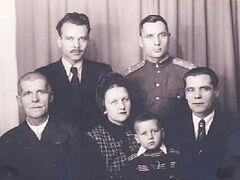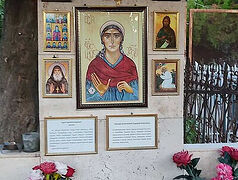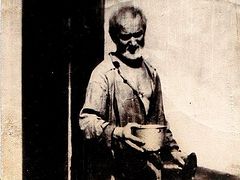Today marks the anniversary of the repose of Elder Maxim (Yugov) of Vologda, a holy ascetic of the nineteenth-twentieth centuries.
***
 The future Elder Maxim (Yugov) was born in 1838 in a large family in the village of Volosovo, Veliky Ustyug District. Egor and Evodkia Yugov had seven children. Fasting and prayer were tirelessly observed in the family, and they would go to church every Sunday and every feast day. When Maxim was three, his father died, and at the age of thirteen, he was left an orphan.
The future Elder Maxim (Yugov) was born in 1838 in a large family in the village of Volosovo, Veliky Ustyug District. Egor and Evodkia Yugov had seven children. Fasting and prayer were tirelessly observed in the family, and they would go to church every Sunday and every feast day. When Maxim was three, his father died, and at the age of thirteen, he was left an orphan.
When Maxim turned sixteen, he went to work at the Krasavino flax mill, and he soon began to act somewhat like a fool-for-Christ. A few years later, he walked to Kiev on foot to pray to Sts. Anthony and Theodosius in the Lavra. He also visited the Holy Trinity-St. Sergius Lavra and the Moscow holy sites.
From the recollections of Elder Maxim:
I thought of nothing then but the salvation of the soul and the future life… Worldly people laughed at me, they disparaged my life; my family took offense, they got angry; I lost heart many times, and once I was so troubled that I wanted to return to worldly life, to engage in worldly affairs; but the All-Merciful Lord the Savior looked upon my humility and put a good thought in me, a sinner. I thought to myself: How many saints have been saved? They also lived on earth; they had flesh and they were saved. And there are holy people now. I will go look for them and ask them to help me and support me on the path of salvation.
I went wandering. As I did so, I heard about good elders, hermits, ascetics in various places and monasteries. I am a lowly and poor man, timid. I felt shy about going in to speak with elders… As I was approaching my native land and was passing by a monastery, some virtuous monk, noticing my timidity and having learned of my desire to see the abbot-elder of the monastery, led me to him… This elder was the abbot of the Monastery of St. Paul of Obnora, Fr. Joasaph, who previously lived in the Sarov Hermitage and had known St. Seraphim. I didn’t talk with Fr. Joasaph for very long, but how sweet were his words. They seemed to me sweeter than honey and honeycomb. And now, as I recall the talk of my teacher and guide, I feel inexpressible joy in my heart.
Fr. Joasaph said to me: “When you begin to live for God, there will be, my son, many temptations both from the enemy and from the world; the wiles of the devil are multifarious and difficult to detect. Live according to the word of God; defeat the enemy by fasting and prayer. When you yourself aren’t able to discern something in this invisible battle, come here, to the monastery. Or, perhaps, not far from your residence there will be a wise elder who will teach you the spiritual life. I will pray for you.”
The abbot sent me to his disciple Fr. Theodore, who lived not far from the Semigorodnaya Hermitage, in a village, and had a cell in the forest where he would retire for prayer and contemplation. I stayed with Fr. Theodore for six months. He showed me an image of the grace-filled spiritual life, teaching not so much by word as by example and his virtuous life… Having strengthened my intention to lead a solitary life, I went home with the blessing of the Elder. Here the Lord blessed me to build a hut, and subsequently gave a precious treasure, which I enjoy, glorifying and thanking my Savior that He, the Merciful One, vouchsafed me to enjoy the sweetness of grace.
My cell, the most squalid, was built in 1867 behind the yard of my spiritual brother Theodore. There was a stable next to my cell… The entrance to the cell was tight, the doors were small, so only one person could get through them. I shut myself up in this cell, leaving it only to go to the forest—the desert… A year later I built a cell in the forest and began to live in it almost continuously.
People were glad when I came back home, and they started coming to see me and asking me to read the Sacred Scriptures, to read about how to save one’s soul. Both young and old, men and women came. A spiritual friendship has been established with some zealous visitors.
Not a few temptations fell to the lot of the ascetic. The Elder realized how weak he still was: “He could serve God with his mind, but it was very difficult to control the flesh.” According to the Elder: “In this earthly life, a man is subject (regardless of spiritual experience and state) to temptations of the flesh until his very departure into eternity. Everything good and kind created by man comes from God. The Lord works in him, weak as he is. God allows temptations that man might not put himself above others.”
The ascetic took food but once a day, in the evening. Sometimes he ate only once every two or three days. Later, the Elder refused boiled food altogether. Only on feast days would he warm up some water and crumble up some rusks into it. On regular days, he simply put cold spring water on them. Spring and summer he gathered edible forest vegetation, including mushrooms.
From the life of Elder Maxim:
During the fasts, the only thing he ate every day was one prosphora. The Elder slept very little, with a birch log under his head. His prayer rule consisted of 100 bows to the Savior, 100 to the Theotokos, 50 to his guardian angel, and 50 to all saints. Then, sitting down, he said 100 Jesus Prayers, and 100 to the Theotokos. Then he made 300 prostrations to the Savior with the Jesus Prayer, with a hymn of repentance sung at every tenth prostration. Then he made 100 prostrations to the Mother of God, with a hymn of repentance at every tenth prostration again. Then he prayed for the health and repose of the soul of his benefactors. During the day, he would read ten kathismas from the Psalter daily, as well as canons, akathists, and other prayers… In his last years, when the Elder began to weaken, he had to abbreviate his prayer rule and mitigate his fasting.
Then the time came when, with the blessing from above, the Elder began to receive the suffering; many listened to his counsel, the sick were healed by his prayers, and people would take his blessing for any significant work. In the last years of his life, he began to shy away from meeting with people and tried to remain in solitude and prayer. According to his contemporaries: “A quiet joy shone upon his face, and a childlike simplicity and gentleness in his eyes.”
Before his death, the Elder returned to the village. The clairvoyant Elder knew the day and hour of his death in advance, and he asked to convey to all his relatives to gather around him on December 13/20, and not to wash his body after death. (Elder Maxim hid from his relatives that he had been tonsured into monasticism with the name Kirill.)
By the grace of God, on the day of his death, the Elder managed to confess and commune of the Holy Mysteries in the Church of the Great Martyr Paraskeva.
On December 13/20, 1906, at eight in the evening, in the presence of his relatives, he peacefully departed to the Lord. On the day of his funeral, numerous healings of the sick began to take place. Elder Maxim was buried near the Church of St. Paraskeva, on a hillock off to the east (six miles from Krasavino, near Veliky Ustyug).
Over time, a small chapel was built over his grave, and to this day, the Elder helps everyone who turns to him in faith, seeking his prayerful help.
Lord, grant rest to the soul of Elder Maxim and save us by his prayers!
From Martyrs, Confessors, and Ascetics of Piety of the Russian Orthodox Church of the 20th Century





